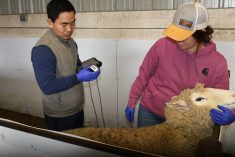Researchers at Oregon State University and the University of Georgia say they have developed an improved, more efficient method to test for the most serious of the parasitic worms in sheep.
The researchers say the test will allow a faster, easier and less expensive way to test for the presence and quantity of Haemonchus contortus, or “barber pole” worms, a species that is very pathogenic to sheep, goats and llamas.
Findings about the new test were recently published in Veterinary Parasitology, a professional journal.
Read Also

Pig transport stress costs pork sector
Popular livestock trailer designs also increase pig stress during transportation, hitting at meat quality, animal welfare and farm profit, Agriculture and Agri-Food Canada researcher says
“This particular parasite is much more pathogenic in sheep than other worms, and previous methods to detect it were very labour intensive and often not commercially practical,” Michael Kent, an OSU professor of microbiology said in a release.
Known as the barber pole or wireworm, Haemonchus contortus is a blood-sucking parasite that pierces the lining of the sheep’s stomach. It’s a prolific egg producer, releasing up to 10,000 eggs per day, and often causes problems in warmer climates or during the summer. Once an infection is demonstrated, expensive treatments or complex management strategies are often needed to address it.
The relatively inexpensive test was developed by microbiologists and veterinary doctors at OSU and UGA, and is now available through those institutions. Anyone interested in obtaining the test can get information on sampling, test results and fees from the Veterinary Diagnostic Laboratory at OSU (http://oregonstate.edu/vetmed/diagnosticor 541/752-5501).


















